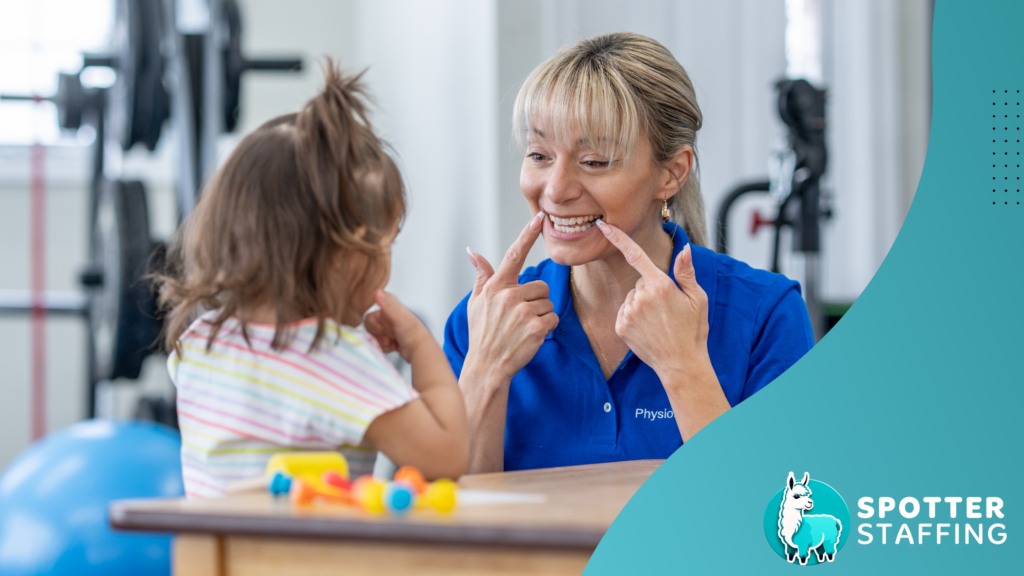Now that you’ve graduated, you are excited and ready to make a difference as a Speech-Language Pathologist! But transitioning from student to professional can feel overwhelming, especially when your first role is in a school setting. But don’t worry—this guide will help you navigate the challenges you can face as a first-year SLP and set yourself up for a rewarding and successful 2025.
Whether you’re working with kindergartners mastering early sounds or high schoolers preparing for life beyond graduation, you have the power to change lives. Here’s how to hit the ground running in your new career.
1. Build a Solid Foundation: Start with a Growth Mindset
The first year as an SLP will involve learning curves, but a positive mindset can make all the difference.
- Embrace being a beginner. It’s okay to not have all the answers right away. The key is staying open to feedback and being willing to learn. Everyone starts somewhere, and you’re starting in a fantastic position with your new degree!
- Set realistic expectations. You don’t have to perfect every therapy session on your first try. Progress, not perfection, is the goal. By setting realistic expectations, you can embrace your progress and not become bogged down by setbacks or missed attempts.
- Celebrate small wins. Whether it’s helping a child pronounce a new sound or organizing your therapy materials, every step forward matters! You are making a difference in the lives of students; by noticing – and celebrating – those steps forward, you can help your students feel excited and committed to their own progress.
2. Master the Art of Time Management
Balancing evaluations, therapy sessions, and paperwork can feel like juggling flaming torches. But with smart strategies, you can stay on top of your workload.
Tips for Staying Organized:
- Use a planner or digital calendar. Schedule therapy sessions, meetings, and deadlines in one place. Try a planner like Planbook or a digital calendar like Monday to keep yourself and your classroom running smoothly.
- Block out paperwork time. Dedicate specific hours for writing reports and IEPs to avoid last-minute stress. Uninterrupted blocks of time are essential for demanding tasks like paperwork. Scheduling focused time not only improves your time spent on those tasks, but also enhances the quality of work because it minimizes distractions and maximizes mental clarity.
- Create a priority list. Tackle high-impact tasks first, like prepping for therapy sessions, to ensure your students’ needs are always met. John Sweller’s Cognitive Load Theory suggests that prioritizing tasks alleviates stress and strain in completing them. By organizing tasks in order of importance, you can focus on one thing at a time, leading to improved problem-solving and efficiency in your classroom.
- Streamline your materials. Organize digital and physical resources for quick access during therapy. Try using a tool like Trello or even Google Drive if you are looking for a free way to keep resources organized and available at all time.
3. Foster Strong Relationships
Your first year isn’t just about the students—it’s also about connecting with the people around you!
- Build rapport with teachers and staff. Teachers can provide valuable insights about students’ classroom performance, while support staff can help with logistics. Make sure you don’t hide inside your classroom. Find – and make! – opportunities to socialize and familiarize yourself with your school’s teachers and staff.
- Engage with parents. Regular communication ensures families are part of their child’s progress and helps build trust. Don’t wait for a parent-teacher night to send progress reports, or reach out to share news about milestones and improvements. Keep parents informed and excited about their child’s time in your classroom.
- Find a mentor. An experienced SLP can offer guidance, answer questions, and help you navigate challenges. Whether you find one through your school, district, or tap into Spotter Staffing’s team of clinical experts, there is a community of experienced classroom speech professionals who are not only rooting for you, but available to assist you with questions, concerns and challenges this year.
- Join a professional community. Whether it’s local SLP meetups or online groups, connecting with peers provides encouragement and fresh ideas. The Illinois Speech-Language-Hearing Association (ISHA) is a central organization for SLPs, offering resources, professional development opportunities, and advocacy tailored to the needs of practitioners in various settings, including schools. And the Texas Speech Language Hearing Association (TSHA) provides the same opportunities and advocacy in Texas!
4. Create Engaging Therapy Sessions
A successful SLP makes learning both effective and enjoyable.
How to Plan Effective Sessions:
- Use evidence-based practices. Ground your strategies in research to ensure therapy is effective. The American Speech-Language-Hearing Association offers many resources and reports to help with evidence-based practices, so don’t be afraid to double check before trying a new therapy tool or technique.
- Incorporate student interests. If a child loves superheroes, use Marvel themed games to make therapy relatable. If they are interested in a specific musician, try working those (school-appropriate) songs into a therapy session. Whatever keeps their attention, and makes students want to participate, is worth uncovering and utilizing.
- Keep activities diverse. Alternate between structured exercises and interactive games to maintain focus and interest. Doing too many structured exercises can lose students’ enthusiasm, and playing too many games can lose track of goal progress. Alternating between the two will keep students moving forward, without getting stuck.
- Track progress visibly. Use charts or stickers to show students how far they’ve come, boosting motivation. Consider using public charts, or “brag tags,” to remind students how well they are doing and how far they have come throughout the semester or school year.
5. Prioritize Self-Care and Avoid Burnout
It’s easy to pour all your energy into your students, but taking care of yourself is essential for long-term success.
- Set boundaries. Leave work at work when possible and protect your personal time. Decide when and how you will work, and stick to it. For example, avoid checking your work email after a certain time or at all during the weekends. Be sure to share your availability and expectations to your students, colleagues, and administrators, and ask them to respect your personal time. Setting boundaries will help you avoid burnout and stress, and create more space for your hobbies, interests, and relationships.
- Practice stress management. Exercise, meditation, or even a walk during lunch can help keep you grounded. It’s important to remember during your first year to take care of yourself and restore your energy and mood. Relaxing and recharging after school hours will help you cope with classroom stress and anxiety, and improve your overall health and happiness.
- Seek support. Don’t hesitate to talk to colleagues or supervisors if you feel overwhelmed. You can’t be the best SLP for your students if you are stretched thin or dreading your work day. Reaching out for help and support is the best way to lighten your load, and show up at your best every day.
6. Tap Into Career Support Resources
Starting strong in your career is easier when you have the right opportunities and support.
Spotter Staffing specializes in helping SLPs like you find rewarding roles in school environments throughout Illinois and Texas. Whether you’re looking for mentorship opportunities, competitive benefits, or schools where you can make a real impact, Spotter Staffing is here to connect you with the perfect position.
Ready to Make Your Mark as an SLP?
Your first year as a speech-language pathologist is an incredible opportunity to grow personally and professionally. With the right strategies—and a little help from Spotter Staffing—you can thrive in your role and positively impact your students’ lives.
Click this link to find your dream SLP job in Illinois or Texas. It’s time to start your journey to success, and you can set yourself up for the best year ever when you join the Spotter Staffing “herd!”


